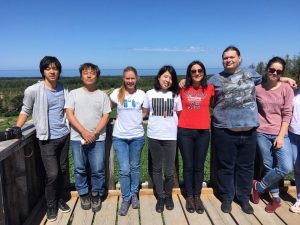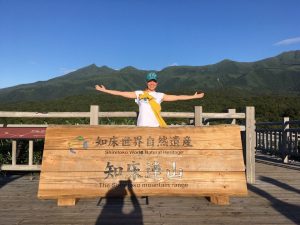Conservation Ecology Fieldwork for Humanities
Iakhnenko Alena
Irkutsk State University
School Faculty of Biology and Soil studies
Major biology
Course Master Year 1
Field work Conservation Ecology Fieldwork for Humanities
Sep. 3rd-7th, 2017
FY2017 Basic Subjects
Content of the report
This year I took part in Course 4- Conservation Ecology Fieldwork for Humanities. The aim of the course was to show us features of conservation ecology and beauty of Shiretoko national park, to give us information about local people of northern Japan – Ainu people and local people of Far East and Asia. We had some lectures and seminars in Sapporo and also we visited Museum of Northern people, Shiretoko national park, reindeer farm, salmon river. All these places are very important to understand the way how Japanese care about their nature and how important are close international relations.
Learning outcomes
During this program I have learned a lot about conservation ecology in Japan, cultural and religious features of northern people, differences and similarities of Ainu people and other northern people in Russia. After the course I have made a presentation using knowledge that I got during the program. I’m sure that the information I’ve learned will help me in future to do my best in biological science and gives me good opportunity to save and improve international relations between Japan and Russia.
Experiences in Japan
The most wonderful thing I saw in Shiretoko was the pathway near Shiretoko Goko Lakes. I was fascinated by beauty of this place. Also I saw such a big work was done by organizers of the park to save nature and to combine the road for people (there are about 500 000 visitors per year) and forest for wild animals, birds and plants. It is the thing which Japan can be proud of. There are many beautiful view points in Shiretoko and I saw no litter there, although there are many people visiting it each year. It shows respectful relations between people and nature.
Influence on future career goals and choices
Participating in RJE3 program gave me a lot of information about similarities and differences of Russia and Japan in different aspects. For example, architecture, culture, conservation ecology, economic and political development. Now I understand that living in Russia we don’t really know important things about Japan. The same situation is in Japan – people doesn’t know real thing about Russia. Just some common, as it is cold there, there are a lot of bears and so on. RJE3 program helped me, my Russian and Japanese colleagues to understand each other. I hope that in my future career we will have collaboration with Japanese colleagues and exchange information and experience.
Comments
I want to say thank you for opportunity to participate in RJE3 program. For me it was wonderful experience of education and travelling. Also I want to give thanks to professor Ikeda and professor Tatsuzawa for this trip to Shiretoko.


